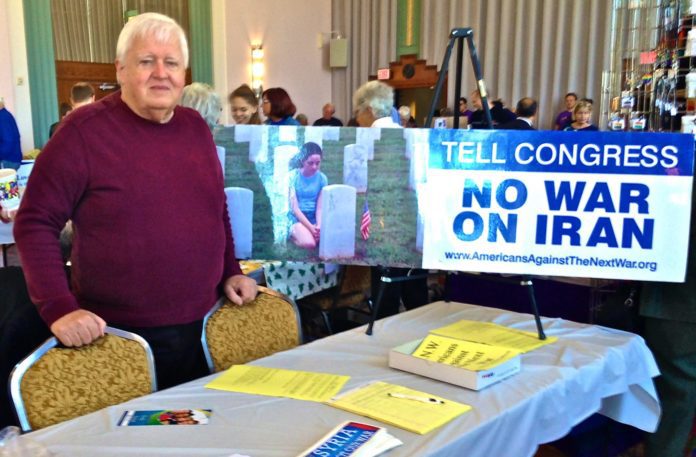BY HAL SPAKE
With the recent extension of the nuclear enrichment talks between the U.S. and Iran, there has been a rising crescendo of calls for a military response, mostly from the same camp that gave us the gift of war in Iraq.
The talks between the two countries are complicated by long-standing resentments on both sides. Americans remember the 1979 Iran Embassy hostage crisis during the Carter Administration. Iranians’ remember 1953, when the CIA’s Middle East Bureau Chief engineered a coup deposing Iran’s democratically elected prime minister. The popular Mohammed Mossadegh was replaced with the Shah and his brutal enforcers, the Savak. This was done because Britain wanted to reclaim Iran’s oil.
Unfortunately, many Americans don’t know this history. News production in the U.S. is by an industry that profits from entertaining or scaring people, and providing little content or historical information. This failure to inform the populous is a betrayal of our heritage. The results are ever-increasing levels of national anxiety and anger.
Not one national news program reminds us that, of the 51 predominately Muslim nations, over half are democracies. Eight of those countries have had female leaders. Few media outlets reported the spontaneous candlelight vigils in Iran after the 9/11 terrorist attacks on America. More than 10,000 people gathered in Tehran to express sympathy and support for the American people. Such events seldom make the news because reporters must report stories about tragedies, outrages, and celebrities.
Today offers a turning point in our history. We can begin sweeping away the CIA’s “Legacy of Ashes” in the Middle East. The people of Iran are unabashedly pro-American. The majority of Iran’s population was born after the ascent of the Ayatollah Khomeini, and most wish for a more representative government.
The current government of Iran helped the U.S. in organizing the Northern Alliance and Pashtun tribal leaders that overthrew the Taliban in Afghanistan. When the U.S. decided to overthrow Saddam Hussein, Iranians again offered aid and intelligence services. The U.S. declined.
Normalizing relations with Iran is a win/win for the U.S. It redefines our apparent destructive role in the area and demonstrates our willingness to lead toward improved relations. It gives us an ally in the area that understands the culture as we engage ISIS.
We must also look at the bigger picture. If peace is to be achieved in the Middle East, the recurring conflicts must be resolved between Jews, Christians and Muslims – the three Abrahamic religions. As Jonathan Sachs, Chief Rabbi of London, said, “Religion … is like fire, and like fire it warms but also burns. And we are the guardians of the flame.”
The Hebrew Bible, in Genesis 12:1-3, teaches that God told Abraham, “I will make you a great nation, and I will bless you and make your name great, so that you will be a blessing. I will bless you and those who bless you and those who curse you I will curse.”
Jews believe this covenant was passed to Isaac, Abraham’s youngest son. As the founder of their tribe they believe the covenant was in turn passed to them. What is rarely taught is that Ishmael, Isaac’s older brother, was also told by God that he, too, would be the father of a great nation [Genesis 17:20].
Muslims believe this covenant was passed to the followers of the prophet Mohammed as revealed in the Quran. Both brothers and their descendants were blessed by God, and those who curse them are cursed by God. Christians believe this blessing was passed to them through Jesus.
So the stage is set for Iran and the U.S. to establish a mutually beneficial future. If we are to be warmed and comforted by our various religious beliefs, rather than consumed by their excesses, religious leaders, ministers, priests, rabbis and imams must teach how each of the Abrahamic traditions received God’s blessing and how each, when they heap curses on the others, are cursing themselves.
– Norman, OK resident Hal Spake has worked for the National Security Agency and is a retired U.S. diplomat. He is chairman of Common Cause Oklahoma and a board member of Americans Against the Next War.
Photo: Hal Spake at the annual Oklahoma City Peace Festival [Courtesy: Darla Shelden]








